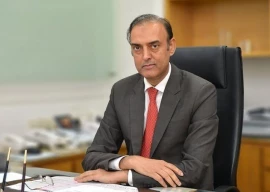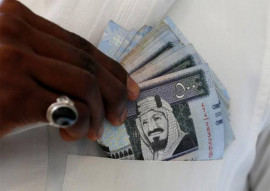
The government has decided, in-principle, to allow individual depositors to invest in government securities through commercial banks; a move aimed at boosting declining savings and ensuring almost double returns to investors against what they currently receive from banks.
Individual depositors will now have the option to ask banks to invest their deposits in government security papers, sources in the Finance Ministry have said. In return, banks will charge a nominal service fees on these investments.
The government had earlier allowed pensioners and trust funds to invest in national saving schemes in a bid to give them better returns on their savings.
Authorities have completed consultations with commercial banks, and the latter have endorsed the proposal. The decision will take effect from July 1, the first day of fiscal year 2012-13.
Central bank data shows that, till April, scheduled banks held Rs5.93 trillion in deposits; higher by Rs800 billion or 15.6% over the corresponding month last year. Currently, the minimum deposit rate is 6% – raised only recently from 5%.
On May 2, the federal government issued treasury bills worth Rs150 billion with three- or six- months maturity period. The three-month papers were sold at 11.87%, while the mark-up on six-month papers was 11.94%, according to the State Bank of Pakistan.
By obtaining deposits at the minimum rate of 6%, banks invest this money in treasury papers at almost double rates, securing hefty profits. Almost half of banks’ deposits have been invested in government papers. The ratio is 65% in case of the two largest banks in the country, according to the central bank.
The government remains the largest borrower due to its burgeoning expenses; which have outstripped revenues at an unprecedented pace. According to finance ministry documents, from July through March the federal government’s budget deficit swelled to Rs1.39 trillion –6.6% of the total economy and the highest ever in nine months. The deficit includes Rs391 billion in payments to reduce circular debt from last year.
According to a recent report by the International Monetary Fund, Pakistan will require Rs7.3 trillion, or 30.3% of its Gross Domestic Product, to meet debt and deficit liabilities for the coming financial year.
Low savings have become increasingly problematic for the country and have resulted in low investment and higher unemployment. Against every hundred rupees earned, Pakistan saves a little over Rs13. The same ratio is 45.5% in China and 29% in India. Average South Asian saving rates are 26%, double Pakistan’s saving rates.
Pension fund
Sources said the government has also decided to establish a pension fund for civil servants. The fund was announced last year but could not be implemented, they added. The fund will serve only the newly-inducted employees.
If employees want to avail pension after retirement, they will have to surrender a part of their salaries; while in return, the government will also contribute a share to double what the civil servant will contribute, the sources said.
Published in The Express Tribune, May 8th, 2012.
COMMENTS (8)
Comments are moderated and generally will be posted if they are on-topic and not abusive.
For more information, please see our Comments FAQ







1732882586-0/Express-Tribune-(7)1732882586-0-270x192.webp)









Yes pay the defaulters and the corrupt directly.
Whatever, the fund to be invested in govt papers shouldn't be available to govt for financing budget deficit. Rather it should be available to the private sector for industrialization amid creating employment opportunities. State Bank of Pakistan must play its role of a strong regulater and ensure the investment be used for productive purposes.
yaawn.... whatever
@Haider H, NBFCs do take individuals deposits. A classic example of NBFCs are asset management companies/mutual funds. In other words let mutual funds, particularly cash/money market and income funds do this job. Since these funds are mostly invested in government securities, particularly T-Bills, these investment vehicles are one of the best ways of providing liquidity and a steady stream of income along with a competitive rate of return (around 10 to 11% at current levels) to individuals, be it small investors/depositors or large ones. Globally, individuals (salaried and non-salaried) invest most of their savings in mutual funds (cash/money market, equity, hedge funds etc.) on a regular basis. Not to mention about the operational nightmare individuals are faced with if they opt to invest directly in the primary or secondary market for government securities in Pakistan, let alone the tax complexities for which mutual funds are the best investment vehicles for now.
The Ponzi must go on.
@Haider H:
Good points.
...And by the way, asking banks to facilitate individuals to buy government securities does not make sense. It's a clear conflict of interest. Banks will always be reluctant to provide advice to their consumers because they will effectively be losing a cheap funding source that is saving them millions.
The best route is to allow NBFCs to open up IPS accounts for individuals. NBFCs don't take indiviual deposits, so there will be no conflict of interest.